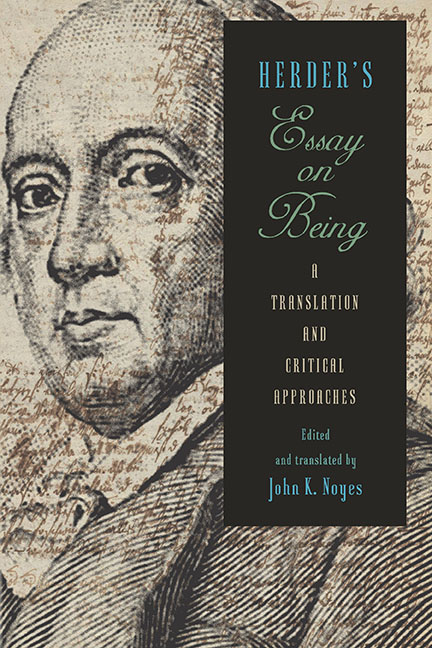Book contents
- Frontmatter
- Contents
- Acknowledgments
- List of Abbreviations
- Introduction: The Essay on Being
- Part I Versuch über das Seyn, by Johann Gottfried Herder
- Part II Critical Essays
- Herder's Essay on Being
- The Order of Being and the Order of Ideas: The Historical Context of Herder's Essay on Being
- Indivisible, Inexplicable, and the Center of All Certainty: Herder's Concept of Being
- The Metaphysical Foundation of Subjective Philosophy in Herder's Essay on Being
- Herder's Kantian Critique of Kant on the Concept of Being
- Attempting to Place the Essay on Being
- Herder's Early Neoplatonism
- Being, Possibility and God: A Comparison of Herder and Heidegger
- Bibliography
- Notes on the Contributors
- Index
Herder's Essay on Being
from Part II - Critical Essays
Published online by Cambridge University Press: 13 April 2019
- Frontmatter
- Contents
- Acknowledgments
- List of Abbreviations
- Introduction: The Essay on Being
- Part I Versuch über das Seyn, by Johann Gottfried Herder
- Part II Critical Essays
- Herder's Essay on Being
- The Order of Being and the Order of Ideas: The Historical Context of Herder's Essay on Being
- Indivisible, Inexplicable, and the Center of All Certainty: Herder's Concept of Being
- The Metaphysical Foundation of Subjective Philosophy in Herder's Essay on Being
- Herder's Kantian Critique of Kant on the Concept of Being
- Attempting to Place the Essay on Being
- Herder's Early Neoplatonism
- Being, Possibility and God: A Comparison of Herder and Heidegger
- Bibliography
- Notes on the Contributors
- Index
Summary
From Idealism to Spinozism and Back Again
HERDER'S “METAPHYSICAL EXERCITIUM” (FHA 1:9; EB, 55) on Being is introduced by the “Prolegomena” and is concluded by a “Concluding Remark” (FHA 1:20; EB, 71). These sections contain epistemological reflections on the formation of concepts in human and divine thought. In the introductory part of his essay Herder first deals with the empiricist thesis that all our concepts are derived from the senses. In its Lockean form this thesis amounts to the denial of inborn truths (angeborene Wahrheiten). If John Locke's distinction of inner sense from outer senses is also accepted, the empiricist claim could be stated more precisely in the following manner: there is no other way to consciousness or inner sense than through the outer senses. That all our concepts are sensible would then mean that the content of these concepts is provided by the outer senses and that their function as concepts is due to the reflection of this content in inner sense. In this theory of concept formation it is presupposed that there are objects outside the mind that affect the outer senses and thereby make possible concepts of the inner sense, which could not be produced in any other way.
Although this empiricist theory seems to be well founded by facts of experience, it has a metaphysical implication that is not obviously true, viz., that there are objects outside the mind that are the causes of its concepts. This metaphysical claim cannot itself be established by empirical knowledge, since what is at issue here is not one or another experience, but the explanation of the possibility of experience in general in terms of the relation of things to the mind. This relation can and must be called into question. For the empiricist account of experience takes for granted what the idealist doubts, viz., that there are objects whose activity produces concepts in the mind such that experience of these objects is possible. It follows that there cannot be an empirical refutation of idealism, since experience itself could have more than one cause.
Other than being generated by objects of the outer senses, there is another possibility that must be considered, namely, that experience is the product of an inner principle of the human mind, viz., that of imagination.
- Type
- Chapter
- Information
- Herder's Essay on BeingA Translation and Critical Approaches, pp. 77 - 88Publisher: Boydell & BrewerPrint publication year: 2018



